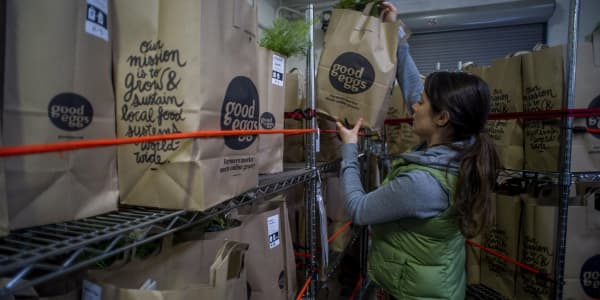Daina Trout spent months brainstorming about the right product for the business that she, her husband Justin Trout and best friend Vanessa Dew wanted to launch. Their liquid sustenance during those all-night sessions was kombucha tea, a fermented effervescent drink that Daina had been brewing at home for a decade. And then it finally hit them: "We'd been guzzling the answer all along," she said.
At the end of 2012, the trio, after a brief time selling in their local Los Angeles farmers' markets, officially launched Health-Ade Kombucha, now sold in several regions of Whole Foods Market, at amazonfresh.com and at Fairway, a Northeast supermarket chain. With nine flavors—including original, ginger-lemon, carrot, and seasonal offerings like pomegranate and California grape—they project their 2014 revenues to be in the low-to-mid seven figures, quadruple their numbers in 2013.
Not bad for a beverage that's made from brewed tea, sugar and a hip-sounding starter culture called a scoby (short for "symbiotic culture of bacteria and yeast.". Whether it's because of consumers' increased interest in digestive health—kombucha has gut-enhancing probiotic properties—or their overall fascination with yet another product tied to physical well-being, sales of kombucha are off the charts.
As a subset in the category of functional beverages—non-alcoholic drinks that contain vitamins, amino acids or other nutrients with health-promoting benefits—kombucha saw 29 percent combined growth across all channels from February 2013 to February 2014, according to market research firm SPINS. For this period, total scanned sales were $122.7 million. A 16-ounce bottle typically costs between $3 and $4, with prices higher in certain markets.
Read MoreThe happiest entrepreneurs in America
"With beverages, even 10 percent annual growth is eye-opening, so nearly 30 percent sales growth is a highly robust rate that we don't expect to slow down anytime soon," said Hannah Crum, who, along with Alex LaGory, are the co-founders and owners of Kombucha Kamp, based in Beverly Hills, which sells equipment and ingredients to home brewers and commercial entities.
"We see kombucha as being a $500 million industry in 2015," said Crum, who also consults to the industry. Early this year the pair launched Kombucha Brewers International (KBI), an organization with a global membership of nearly 50 producers, including Trout's Health-Ade.
Not surprisingly, Whole Foods Market hopped onto the kombucha bandwagon early. "Depending on the store, kombucha now occupies about one-third of our refrigerated functional-beverage shelf space," said Errol Schweizer, executive global grocery coordinator for Whole Foods Market. "We haven't seen our kombucha limit yet, and our regional buyers are very open to evaluating new offerings." In addition to more established national kombucha brands, the company also sells about two dozen locally produced kombucha teas at many of their 371 retail stores around the country.
In fact, said Schweizer, Whole Foods' growth in the category is tied to these small producers, like Buddha's Brew Kombucha from Austin, Texas; Brew Dr. Kombucha from Portland, Oregon; and Luna Kombucha from Columbus, Ohio. He believes it's precisely the producers' awareness of growing competition that has led to the bulk of kombucha innovation, including the use of creative and fair-trade ingredients and experimentation with unusual flavor profiles. "These new brands really want to distinguish themselves," he said.
Read MoreTaking shots for your health
Schweizer points to Buchi Kombucha, based in Asheville, North Carolina, whose brew—heavy on medicinal herbs and roots, which have been tied to having health benefits—caught the attention of a regional vice president. Whole Foods wound up providing the company with two "local-producer loans" to help them expand production and distribution. "We wanted to help bankroll their success," he said, noting that over the past seven years, the chain has provided local-producer loans totaling more than $10 million.
"We came on the scene just ahead of the kombucha explosion and have been able to grow with it," said Jeannine Buscher, who, with Sarah Schomber, co-founded Buchi in 2009. In 2013, their sales hit mid-six figures. This year they project low-seven-figure revenues. Schomber anticipates that KBI (of which Buchi is a member) will help set industry standards and become both a collective voice for producers and a way to communicate and educate consumers directly. "We want kombucha to evolve as craft beers have, and we'd like to see more research conducted to validate and support health benefits attributed to kombucha," she said.
However, it's not just health food stores that have embraced the tangy drink.
Wegmans Food Markets, with 84 stores in the Northeast, now sells three different brands. "Kombucha continues to grow in sales, and year over year, depending on the brand, we've seen between 12 percent and 20 percent growth," said Jo Natale, director of media relations.
Read More11 common reasons small businesses fail
Schnuck Markets, a 98-store chain in the Midwest, has also embraced the trend. "We're now rolling out a more expanded variety of kombucha teas in more of our stores, based on the strong consumer response we had to last year's limited-product launch in our Des Peres, Missouri, store," said Lori Willis, director of communications.
Maria Brous, director of media and community relations for Publix Super Markets, said the Southeast chain, which has more than 1,075 stores, recently began carrying GT's Kombucha in its produce departments and that select stores may carry as many as a dozen more of that brand's flavors.
But with so many kombucha entrepreneurs entering the fray, what are the chances of all of them finding shelf space in large, conventional supermarket chains?
G.T. Dave, CEO of GT's Kombucha (Dave, who founded his company in 1995, is widely regarded as the force behind the modern kombucha industry), said the challenge many small producers face is having to pivot from a local to a national mind-set. "National retailers want to ensure these entrepreneurs have the resources to meet high-quality standards and high-volume needs," he said.
Chris Reed, founder and CEO of Reed's, best known for its Reed's Ginger Brew, is now growing his Culture Club Kombucha, launched two years ago. Reed, who already had a distribution channel, said his products' longer shelf life and the brand's flavor profiles—hibiscus-grapefruit-ginger is his best seller—is what convinces big-box store buyers to give Culture Club a berth.
Expect even greater consumer outreach by kombucha producers down the line. "Along with increased sales, what we're seeing is that these products are moving in a more mainstream direction, with flavors similar to conventional sodas, like cherry, and in bottles that look like soft-drink containers," said Tom Vierhile, innovative insights director of London-based Datamonitor Consumer.
A good example of how upstart brewers are garnering new fans is LIVE Soda Kombucha, based in Austin, Texas, with six ballpark-worthy flavors, including Revive Root Beer, Culture Cola and Dreamy Orange. Target will begin carrying the brand in its 1,500 stores in September.
—By Coeli Carr, special to CNBC.com





